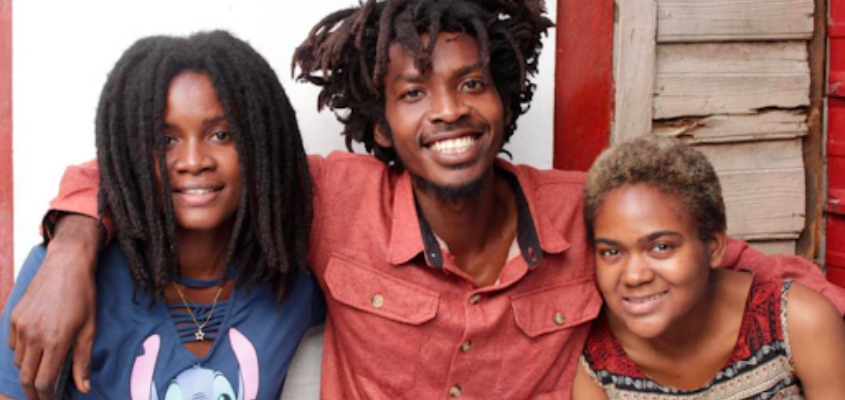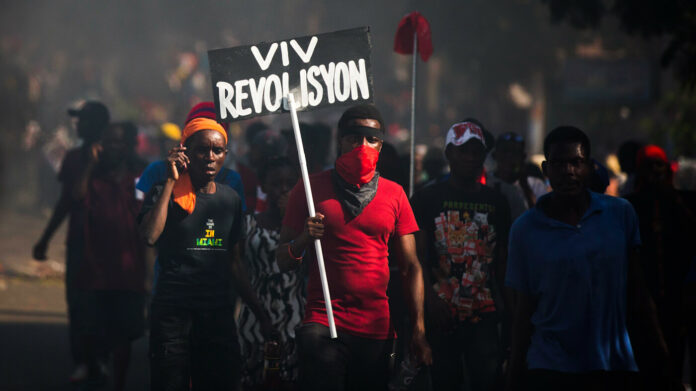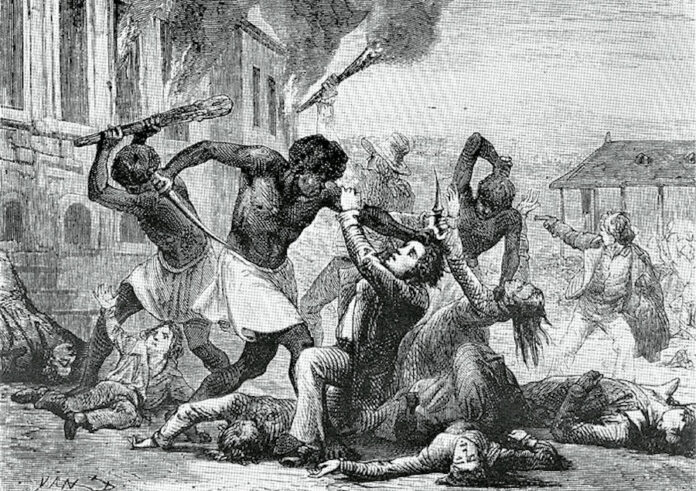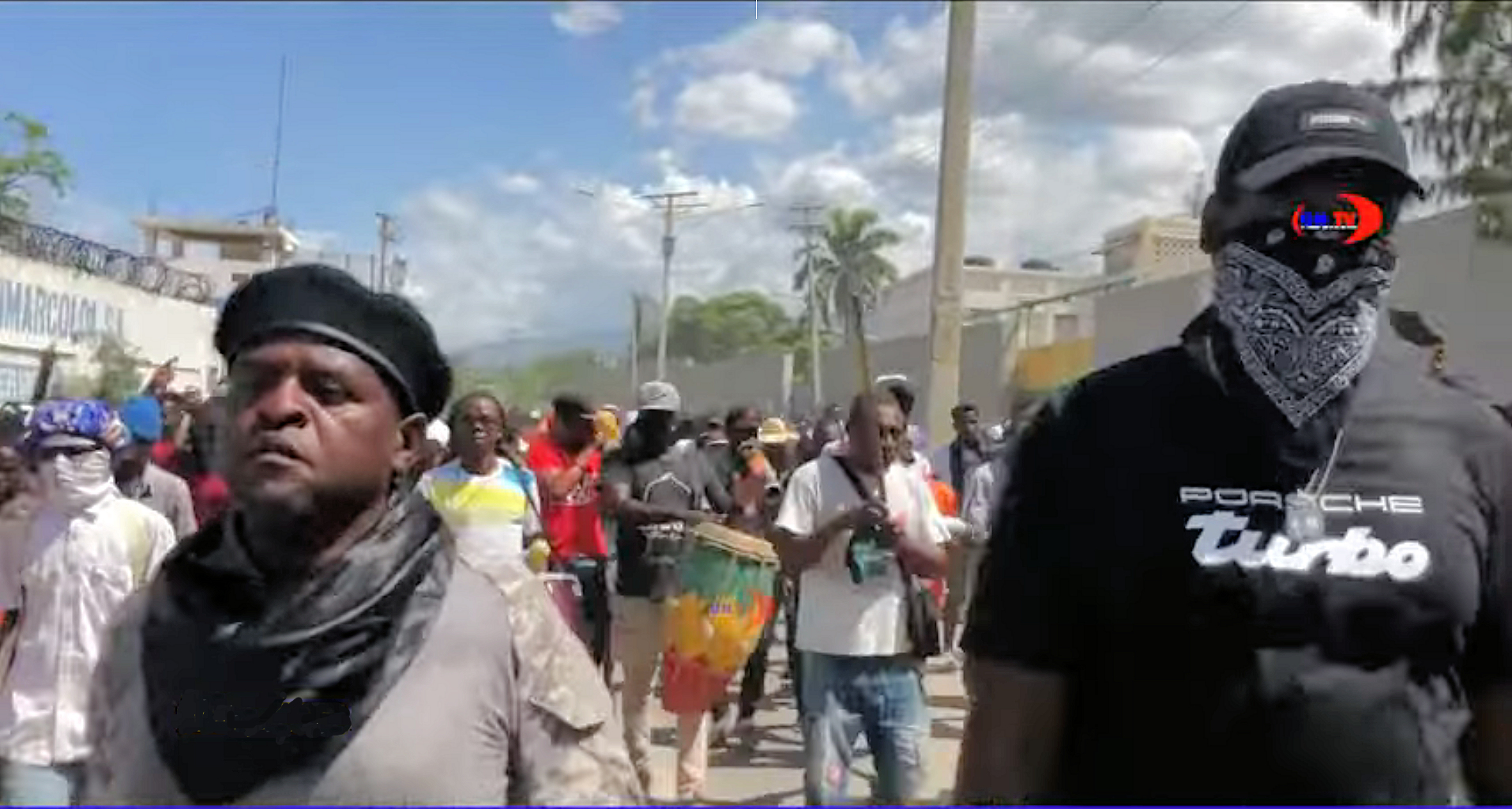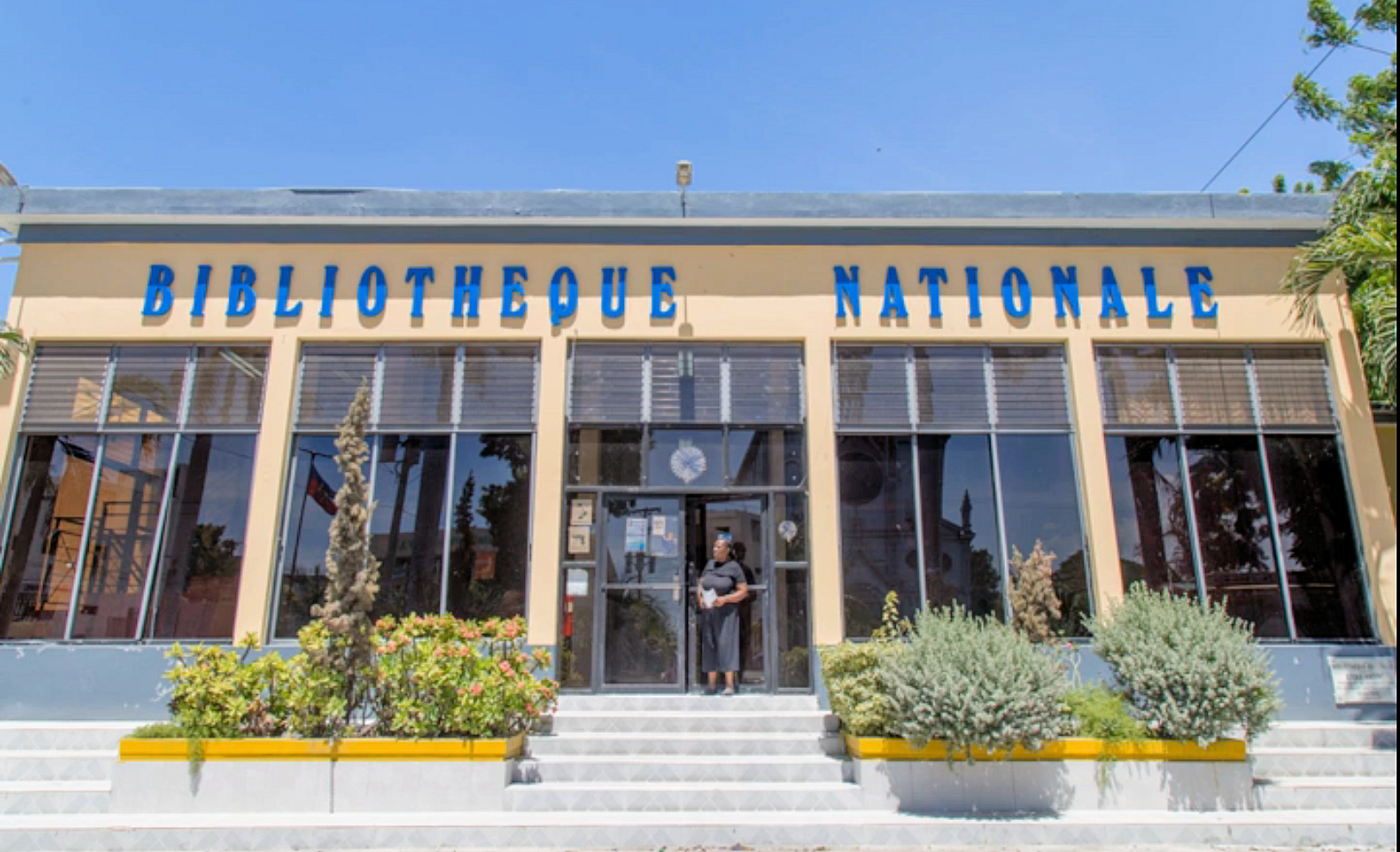Haïti: The Barbecue Revolution – Civil War & Viv Ansanm’s Path to Power
Posted by INTERNATIONALIST 360° on MARCH 22, 2024
New Black Nationalism
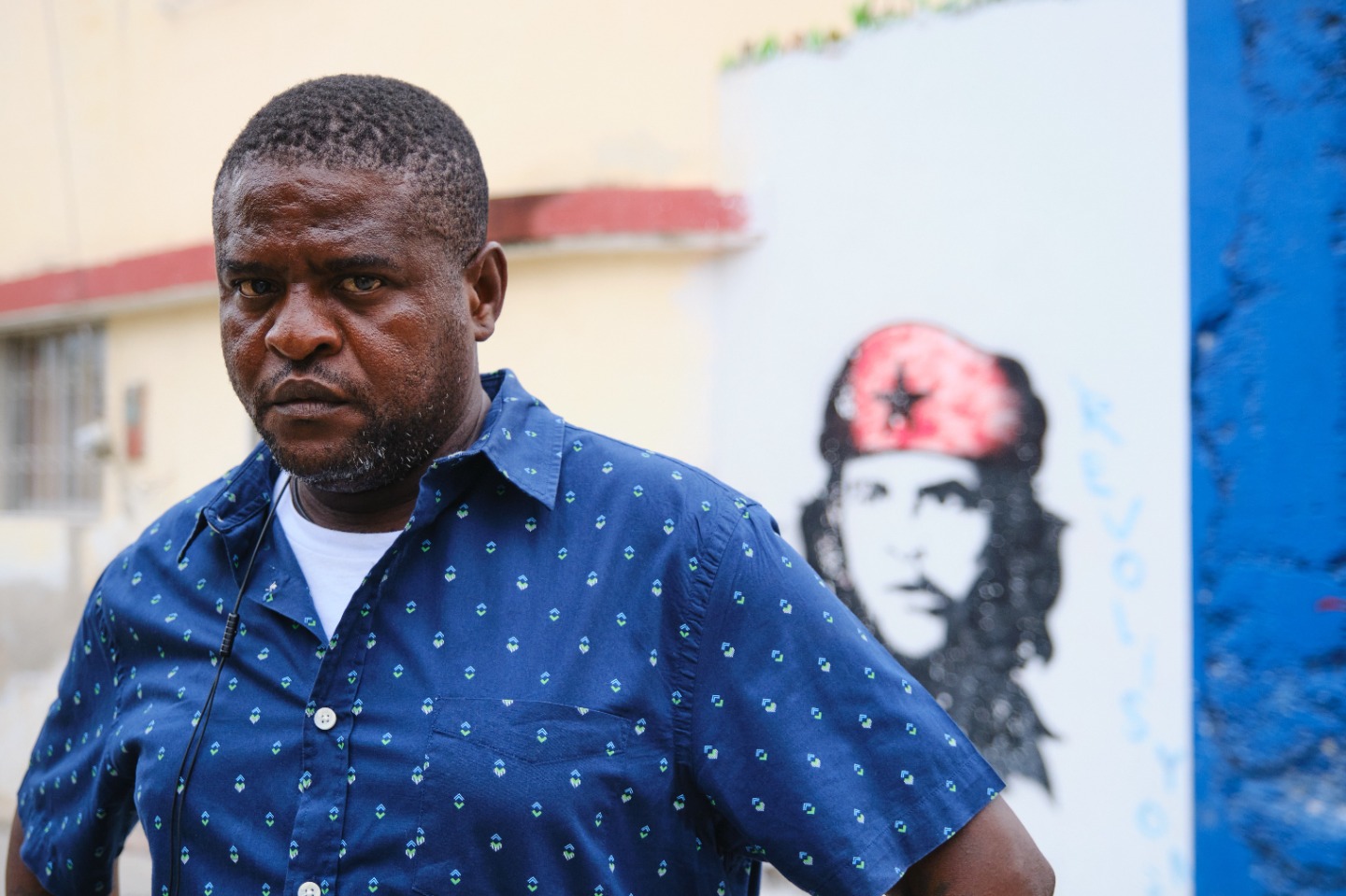
“We are an organization of nationalists, focused on the country and the ghetto, who united to dismantle a number of vagabonds and gangs that politicians use to harm the ghettos each time they seek to take power. We have formed it so the ghetto gets its share…Hungry people don’t play around.”
– Jimmy ‘Babekyou’ Chérizier
A New Black Nationalist Network Strategic Briefing Paper
Today, New Black Nationalists urge the people of Haiti to take control of Port-Au’-Prince and establish a provisional governing structure. We call on the people of Port-Au’-Prince to defy emergency rule, flood the streets, and remain there until the government resigns. The police will not commit mass genocide against its own people. Nor is there a commanding figure in Haiti’s government that can compel them to do so: not Mathias Pierre, not Ariel Henry, not Claude Joseph, and not Joseph Lambert.
The Biden Administration doesn’t trust them either.That’s why they are refusing to send U.S. troops–at least for now. The Biden Administration doesn’t know who is in power in Port-Au’-Prince. That means power is now in the hands of the Haitian people. You just haven’t taken it…
There are rumors that Jimmy “Barbecue” Chérizier and the “Revolutionary Forces of the G-9 Family and Allies,” are calling for a “people’s “revolution.” Mr.Chérizier, the ex-policeman and “reputed gang-leader,” may have a checkered background. He may not be another Toussaint Louverture, but could a people’s coalition government include a role for the G-9 Family?
Introduction – Viv Ansanm’s February 29 Leap Year Revolt Opens Civil War
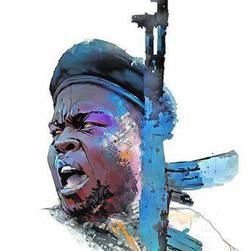
Viv Ansanm! (Living Together)
On February 29, an advanced detachment of paramilitary groups who once visited violence on each other at the behest of Haïti’s oligarchs and party bosses launched a massive, coordinated assault on the government.
When 30 police stations and the National Police Academy were sacked, the two largest prisons overrun and 3,800 inmates freed, the Port-au’-Prince seaport, National Palace, and the Toussaint Louverture International Airport assaulted and laid under siege, Haïti’s government fell. It collapsed under the weight of its comprehensive corruption and U.S. imperial plunder.
Surging out of the Western Hemisphere’s poorest ghettos, Viv Ansanm’s nouveau nationalists and their charismatic leader JimmyBarbecue Chérizier, stand on the precipice of achieving something extraordinary–toppling Haïti’s ruling oligarchs and their U.S. imperialist backers.
Should Viv Ansanm win significant support from Haïti’s diaspora, and Blacks in America’s Democrat Party threaten to torpedo Joe Biden’s presidential candidacy if Secretary of State Blinken invades Haïti, with the so-called Multilateral Security Support Mission (MSS), Viv Ansanm may well succeed.
From the New Black Nationalist Network’s (NBN) standpoint, the February 29 Leap Year Revolt signaled the opening salvos of civil war in Haïti. The reports of gunfire piercing through Haïti’s streets and reverberating around the planet were from the muzzles of Viv Ansanm’s AK-47s. No amount of yellow journalism from the Washington Post and New York Times asserting Haïti’s crisis stems from gang violence run amok can obscure that reality. An all-out struggle for political power is unfolding in Haïti’ between two opposing camps representing vastly different interests.
“If Ariel Henry doesn’t resign, if the
international community continues
to support him, we’ll be heading
straight for a civil war that will lead
to genocide.
The first step is to overthrow Ariel
Henry and then we will start the
real fight against the current system,
the system of corrupt oligarchs and
corrupt traditional politicians.”
Haïti had been maintained as a permanent “failed state” of American Empire long before Jimmy Chérizier and Viv Ansanm came on the scene. Nor was “gang violence” a justification for military intervention when the Tonton Macoute killed 60,000 Haïtians under the Duvalier dictatorships for 27 years.
Since 1900, Haiti has had nine coups, three U.S.-directed invasions, and 23 years of American troop occupation. Haïti’s dictators were propped up by American foreign aid while the rest of the country served as a laundromat for its oligarchs and foreign enablers to clean their dirty money, fleece Haïti’s resources and ruthlessly exploit its people.
The subjugation of Haiti’s people was such that when Jean Bertrand Aristide became Haïti’s first democratically elected President in 1990, his goal was to move the country from “abject misery to dignified poverty.”
But this is a new day. Recently, the Revolutionary Forces of the G-9 Family and Allies, a novel neighborhood social reform organization of nine groups who vowed to end Haiti’s oligarchic system was joined by the G-PEP organization. Together they promised to challenge foreign troops entering Haïti under U.S. Secretary of State’s imperial mandate to restore order in Haïti’. The amalgam of these urban rebels with a cause was renamed Viv Ansanm (Living Together in Creole).
If reports by the United Nations are to be believed, 80% of Port-au-Prince’s geographical footprint is in the hands of paramilitary groups and other non-state actors. Whatever that percentage is, Viv Ansanm now controls the lion’s share of it. Viv Ansanm’s innovative upstarts acted on their strategic assessment that Haïti’s political and security vacuum was a target-rich environment to be exploited. They leaned forward to fill it.
When mass outrage peaked across Haïti at reports Prime Minister Henry was putting off the delayed 2023 national elections until 2025 and traveling to Kenya to recruit another military occupation force, Viv Ansanm struck. Their coordinated attacks on government institutions that backfooted Haiti’s National Police suggest two things: significant defections among the PNH’s 9,000 officers, and inside intelligence Viv Ansanm received from its informants.
Leveraging its strategic advantage, Viv Ansanm’s unexpected first strike has allowed it to dictate the pace of events and choose the time and place of battle.
By seizing the airport and forcing Ariel Henry into exile in Puerto Rico, Chérizier temporarily blew up Ariel Henry’s, Tony Blinken’s, and Kenyan President William Ruto’s plan to expedite the deployment of the so-called Multilateral Security Support Mission (MSS) to invade Haïti. The Leap Year Revolt also prevented Henry from returning to Port-au-Prince to spearhead a counterinsurgency effort. As a result, Cherizier acquired precious time for Viv Ansanm to consolidate its military gains.
Having plussed up Viv Ansanm’s insurgent fighting forces, military-grade weapons capability, and support bases across Port-au’-Prince, Jimmy Chérizier told Al Jazeera News, “Now our fight will enter another phase – to overthrow the whole system, the system that is five percent of people who control 95 percent of the country’s wealth.”
The Myth and Legend of “Babekyou”
Jimmy Barbeque Chérizier grew up in Port-au-Prince’s Delmas, Quest arrondissement where he served as an exemplary police officer for 14 years. His story is known to all. As one of eight children, he lost his father at the age of five and sold his mother’s fried meats in the local market to help the family. Thus, the sobriquet and legend of Babekyou was born.
As Kim Ives of Haiti Liberté reported, “Cherizier, was a cop with an elite unit of the Haitian National Police called UDMO, the Departmental Unit of Maintenance of Order. In November of 2017, he was ordered by police leadership to put together a team of ten people from the station that he commanded in Cité Soleil to carry out a raid against the gangs in the area of Martissant.
There ensued a dramatic battle between cops and gang members. A number of gang members were killed, and maybe some civilians, too. It’s unclear exactly what happened. Police leadership said, “Oh, no, this was a rogue operation, it was Cherizier who did it.” They hung him out to dry, made him the scapegoat. This immediately started his radicalization. He started to see that this force he had been so devoted to was betraying him and trying to use him to cover for their own screwups.”
The rest is history. In Haïti’s rogue’s gallery of Duvalier dictators, Tonton Macoute enforcers, coup plotters, and assassins, Chérizier is the only Haïtian ever to be sanctioned by the United Nations. The 2022, resolution stated he “engaged in acts that threaten the peace, security, and stability of Haiti and has planned, directed, or committed acts that constitute serious human rights abuses.” There is not a shred of evidence to support these claims.
Chérizier has been excoriated by the international press as a murderer, gang leader, kidnapper, and notorious mastermind of Haïti’s underworld. Even his childhood nickname “Barbeque” has been caricatured, racialized, and held up for ridicule.
In Port-au-Prince’s teeming Delmas arrondissement, however, Babekyou is both a term of endearment and an action word. In truth, Chérizier is a man of simple taste who gets things done. He neither minces nor wastes words when speaking in the popular vernacular of Haïtian Creole. “Hungry people,” he says “don’t play around.”
When Chérizier appears, his forceful persona dominates the public space. But for all the scorn and vilification heaped on him as a thuggish brute, within the Viv Ansanm federation he functions more as a “first among equals.” He keeps his word, and he is a reasonable negotiator.
Chérizier is also given to very public displays of humility and emotion that belie his strongman image. In a wrenching effort to forge a truce with another paramilitary organization, Chérizier knelt before the rival group at a public meeting and pleaded with them to make the peace. They didn’t budge.
In another instance, Chérizier, who was very critical of President Jovenel Moise as a tool of the oligarchs, wept at a public memorial service for Moise after his assassination. While his detractors howled that Chérizier’s tears proved he was the tool of Moise, he responded by saying this.
“I cried because I was frustrated, and my emotions were unleashed. How can a country that took its independence go through all this humiliation? How can a sovereign country let a band of criminals and delinquents come all the way from Columbia to assassinate Haiti’s first citizen? As nationalists we love our country. Even if the opposition were to gain power, we would never collude with any foreign power to assassinate our own president. That revolted me. ”
In our view, Chérizier’s words reflect the ethics and principles of the Fanonist new nationalist movement. We take responsibility for our people’s actions and our nation’s shortcomings. We don’t complain and dwell on grievances. We acknowledge our problems and differences. We try to resolve our issues through principled discourse and move on to fight the battles that must be won.
The Barbeque Revolution: Triangulation Strategy and Three-Dimensional Chess
Jimmy Chérizier is also well-schooled in the arts of three-dimensional chess. He will need to summon these assets and surround himself with a talented circle of strategists and operatives to execute his plan to rid Haïti’ of foreign imperial powers (United States, France, and Canada) and corrupt oligarchs.
For those who think Chérizier is just another loudmouth thug with a military-grade assault weapon, they should think again. He said Prime Minister Ariel Henry had to step down. So did most of Haïti’s politicians who have been squabbling to take Henry’s place. But it was Chérizier who acted. Henry is now deposed.
New Black Nationalists reiterated Cherizier and Viv Ansanm’ s actions that precipitated Henry’s ouster to underscore an important point. Cherizier’s is counting on his adversaries continuing to underestimate his capabilities to develop a strategic model to win a liberation war and Viv Ansanm’ s ability to carry the day on the battlefield. He also believes Haïti’s elites, oligarchs, and Tony Blinken’s educated whiz kids sitting in front of their computer screens in Foggy Bottom, have no clue about the strategic depth his movement enjoys on the Haïtian street.
Cherizier knows that revolutions are typically fought between two numerically small armies of combatants. This will be an up close and personal street fight that the least committed force is going to lose. The battle for Haïti’ is not going to end like 2004. There is no president to kidnap from the National Palace and force him on an airplane bound for the Central African Republic.
NBN believes Blinken’s Black Caribbean Mercenary Brigade will not be committed once the bullets start flying. Neither will mercenaries paid for by the oligarchs. But we have digressed, haven’t we?
In chess, game theory dictates that there is an opening, middlegame, and endgame strategy. If the opening is characterized by players developing their pieces, gaining control of the center of the board, and establishing a foundation to create multiple attack options in the middlegame, then Chérizier and Viv Ansanm’ have won the opening. The question is what comes next?
At the heart of Chérizier’s grand triangulation strategy are three overarching goals.
Build and lead the broad united front for a new Haïtian nationalist movement.
Politically defeat The Kingston Group and oligarchs’ plans to capture Haïti’s government.
Defeat Blinken’s Black Caribbean Mercenary Brigades occupation force (BBCMB).
To accomplish these three goals, NBN believes Chérizier has mapped the architecture and sequencing of a bifurcated military strategy to win state power.
What do we mean by a bifurcated strategy? Namely, Chérizier’ has calculated that to capture state power he must win two wars: Haïti’s internal civil war, and the war against the occupation forces of Blinken’s Black Caribbean Mercenary Brigade.
From NBN’s reading of Cherizier’s statements, we surmise he has concluded defeating Blinken and Biden’s invasion force will be the most decisive factor in determining who will win Haïti’s civil war. Thus, winning the war against the American-sponsored occupation is driving Viv Ansanm’s overall strategy.
In part, Cherizier’s dilemma is the sequencing of the civil war and the impending war of resistance against Blinken’s Multilateral Security Support Mission (MSS). Presumably, the civil war Viv Ansanm initiated on February 29 will give way to fighting a war of resistance against Tony Blinken’s invasion force in the next few months.
But things may not be that simple. One has to assume other paramilitary forces will side with Blinken’s MSS units for some type of compensation. Or, what if Jean-Charles Moïse and Guy Philippe decide their political strongholds in the Nord and Nord Est departments won’t support Blinken’s occupation brigade or Viv Ansanm’s resistance forces? What happens if Moise and Philippe declare Nord and Nord Est are neutral autonomous regions they are prepared to defend if Viv Ansanm or Blinken’s MSS occupation forces encroach on their territory?
While most of the news reporting has focused on the collapse of Haiti’s central government and the fighting around the Port au’-Prince metroplex, Catherine Charlemagne followed events throughout February in the Nord, Nord Est, and Central Plateau departments. These areas have had a series of intense demonstrations, standoffs and clashes between anti-Henry protestors and the PNH.
Throughout the twists and turns of Haïti’s governance crisis and military conflict, the nation’s political parties, civic and business leaders, paramilitary groups inside and outside of Viv Ansanm, and the oligarchs (Reginald Boulos, Gilberto Bigio, Reginald Deeb, Sherif Abdullah, and Dimitri Vorbe) will be switching sides and forming temporary alliances.
To discern who the oligarchs are backing we suggest you follow the money, although we suspect their financial largesse will be spread around as an insurance policy to cover unexpected contingencies.
What seems to be unfolding as the most likely future scenario in Haïti’ is that the relative pause in fighting around Port-au’- Prince will hold. After incessant squabbling, The Kingston Group will finally agree on the composition of the seven-member Transitional Presidential Council and the selection of an Interim Prime Minister. In May or June, the so-called Multilateral Security Support Mission (MSS) will be formed and a date to invade Haïti will be set.
If this scenario plays out, Cherizier is confident he can unite a Haïtian Resistance force to defeat Blinken’s Black Caribbean Mercenary Brigade. Having won the war against the occupation, Viv Ansanm would then have to reassess the scope of renewing a civil war to win state power.
Should Blinken’s Multilateral Security Support Mission lose, falter, or never gets off the ground, most of the accommodationist Kingston Group political parties and civic groups that support it will be discredited. At that juncture, Viv Ansanm would probably be confronted by a crack force of predominantly Haïtian paramilitary forces bought and paid for by the oligarchs and dirty foreign money.
Viv Ansanm’s February 29 Leap Year Revolt that opened the first phase of Haïti’s civil war has for the moment settled into an uneasy de facto power-sharing arrangement. Viv Ansanm and other paramilitary groups effectively control most of Port-au’-Prince’s metroplex, while Finance Minister Michele Boisvert is handling the day-to-day administrative affairs of Haïti’s rump government.
The longer this power-sharing arrangement remains in place, it redounds to Viv Ansanm’s advantage. If Viv Ansanm seizes the opportunity during the relative lull in fighting, they can create provisional structures to deliver food and water to the masses and curb gratuitous violence perpetrated by bad actors. Creating shadow government organs to get the streets clean and possibly even ration gas would begin to demonstrate their ability to grapple with the affairs of governance.
In the whirlwind of events that have turned Haiti upside down since February 29, Cherizier has not taken his eye off the ball. He continues to warn the Haitian people they must prepare to meet and turn back Blinken’s Black Caribbean Mercenary Brigade at the gates.
In this regard, Haïti’s accommodationist political and civic elites that met with CARICOM and U.S. Secretary of State Blinken in Kingston, Jamaica handed Cherizier two huge political gifts.
The CARICOM / Blinken Emergency Meeting Debacle in Kingston
At the CARICOM/Blinken March 11 “emergency” conference Ariel Henry tendered his resignation. CARICOM’s 15-member Caribbean States organization approved an agreement to establish a Transitional Presidential Council (TPC). The seven-member council which most closely reflected the Claude Joseph EDE proposal will develop a process to conduct a national election in Haïti’ and select an interim Prime Minister to begin running Haïti’s government.
More importantly for Blinken and Biden, the Transitional Presidential Council (TPC) not only needs to be seated but must appoint an Interim Prime Minister before Kenya can take control of the so-called Multilateral Security Support (MSS) Mission to invade Haïti.
As reported by the Miami Herald, the Kingston Group accommodationists bickered publicly about the CARICOM plan and what names to submit, possibly putting the creation of the TCP at risk. U.S. State Department spokesperson Matt Miller said he expected the group that met with Blinken behind closed doors to name the seven council members by Wednesday. It didn’t happen. As of March 16, only five names were submitted to CARICOM.
Two critical developments came out of the CARICOM / Blinken Emergency Meeting that substantively impact the struggle for power in Haïti.
First, everyone selected for the seven members serving on the Transitional Presidential Council and the Interim Prime Minister must endorse United Nations Resolution 2699 which supports the creation and deployment of the Multilateral Security Support Mission (MSS). This is a scandalous indictment of all the signatories.
Second, the conditions for participation on the TPC ban anyone that has been indicted or convicted in any jurisdiction, and anyone sanctioned by the United Nations. In short, the TPC agreement delineates who among Haïti’s political and civic elites is supporting Blinken and Biden’s war of occupation which the Haïtian majority does not support.
In an interview with Al Jazeera, Cherizier asserted that,
“We’re not going to recognize the decisions that CARICOM takes. I’m going to say to the traditional politicians that are sitting down with CARICOM, since they went with their families abroad, we who stayed in Haiti have to take the decisions.”
What most of The Kingston Group didn’t bicker about is who won’t be included in their plan for Haïti’s next government. The agreement in part states the following.
The Declaration for the Establishment of a Transitional Presidential Council and the naming of an Interim Prime Minister:
The exclusion from the Transitional Presidential Council of:
–Anyone who is currently on a charge, indictment or has been convicted in any jurisdiction;
[The Guy Phillipe exclusion clause] NBN’s notation
–Anyone who is under UN Sanction;
[The Jimmy Barbecue Chérizier exclusion clause] NBN’s notation
–Anyone who intends to run in the next election in Haiti;
–Anyone who opposes the UN Security Council (UN SC) Resolution 2699.
[The screw 85% of the Haitian population who oppose Blinken’s Black Caribbean Mercenary Brigade occupation force clause] NBN’s notation
Among the groups that make up the council are the following:
EDE/RED, a party led by former Prime Minister Claude Joseph
Montana Accord, a group of civil society leaders, political parties, and others
Fanmi Lavalas, the party of former President Jean-Bertrand Aristide
Jan. 30 Collective representing several parties & former President Martelly’s PHTK Party
Beyond the bickering and jousting by the groups and parties that met in Kingston, there were also forces that withdrew from the TPC selection process.
Jean-Charles Moïse, former presidential candidate and leader of the Petit Desalin Party announced they will not join a council. Moise said, “This is the same government we just kicked out of the country, and now CARICOM is asking for us to go negotiate? For us to go sit down with this government?”
Guy Philippe: An Opportunist for All Seasons
Jean-Charles Moise has also allied with former rebel leader Guy Philippe, chief organizer of the coup that toppled Jean Bertrand Aristide’s government in 2004. A convicted money launderer sentenced to nine years in a Miami prison, Philippe, was released three years early in September 2023 and is now a leader of the Réveil National political party.
Reveil National proposed a new three-member presidential council with Philippe as president of Haïti and possessing the authority to name the Interim Prime Minister. While Moise supports the three-member presidential council concept his choices were Judge Durin Junior Duret (President of the Council), Guy Philippe (member) and Françoise Saint-Vil Villier (member).
Criticizing CARICOM and the Kingston Group, Philippe contended that, “No citizen, no Haitian could accept this proposal from the international community because it is this same international community, in complicity with the political and economic elites of Haiti, that got us into this crisis.”
While Jean-Charles Moïse and Guy Philippe both rejected the legitimacy of the CARICOM process and the TPC, neither criticized its mandatory support for the Multilateral Security Support Mission. We wonder if that was merely an oversight.
Petit Desalin will not be the only party that rejects the CARICOM TPC agreement protocols. Nor does their rejection of the CARICOM / TPC agreement necessarily place them in the nationalist camp or the Haitian Resistance movement. These two issues are the nexus of Cherizier’s attempt to build a new Haitian nationalist project.
Nor will there be any shortage of political opportunists like Guy Philipe, who is comparing his return from incarceration in Miami to become president to Nelson Mandela’s imprisonment in South Africa. We just don’t recall Mandela being arrested for money laundering dirty money for narcotics traffickers. Since being released from prison six months ago, Philippe spoke at several rallies calling for Henry’s resignation from the Prime Minister’s office.
Philippe secured the endorsement of some paramilitary groups and is politically in league with Petit Desalin party leader Jean-Charles Moïse. Apparently, Philippe has also reached out for support to Jimmy Cherizier.
While further analysis needs to be done, the New Black Nationalist Network’s preliminary assessment suggests Guy Phillipe is being positioned as a cut-out–a strongman option to install as president if The Kingston Group falters and Blinken’s Black Caribbean Mercenary Brigade occupation project starts going sideways. So, he has to be kept in play, even if the TPC protocols deem him ineligible to serve as president or as a member of the TPC council.
Guy might be a little rusty after spending six years in jail, but in addition to being an experienced coup plotter he was formally the Chief of Police in Cap Haïtian. Philippe is a plug-and-play option that can fulfill multiple roles in service to the forces of reaction in Haïti if called upon.
One of those roles appears to be as a mediator for the paramilitary insurgents. There is a theory that some of the paramilitary units unleashed their attacks two weeks ago to improve their bargaining position for amnesty when a new government is formed and Blinken’s rent an army comes charging over the hills of Petionville. Philippe has taken on the role advocating for amnesty for these groups. In a recent interview he explained his position to the New York Times this way: “We have to tell them you will put down the weapons or you will face big consequences. If you put down the weapons you will have a second chance. You will have some kind of amnesty.”
And just who is going to give these lads amnesty? Does anybody believe that? Here again, Philippe is playing both sides against the middle. Asking for paramilitary groups’ support for his presidency on the one hand while seeking to disarm them on the other.
At its root, it is a message of cynical defeatism. Philippe is telling the paramilitary groups they can’t win, so cut the best deal you can and save yourselves. It’s a very different message from Jimmy Cherizier’s.
Shutting Down Blinken’s Black Caribbean Mercenary Brigade
Finally, it must be said that the deployment of Blinken’s Black Caribbean Mercenary Brigade can be stopped before deploying to Haiti. In Canada, France, and the Caribbean a political firestorm of opposition needs to be built to challenge the Multilateral Security Support Mission’s legitimacy and true purpose.
The Fanonist New Black Nationalist Network in American Empire’s metropole calls on all Fanon activists, especially in the Francophone diaspora to raise their voices in opposition to the planned occupation of Haïti.
In the Caribbean, the most important countries to target are the participating nations of Jamaica, the Bahamas, Guyana, Antigua, Barbuda. Whatever illusions these crack troops may harbor, they should know they are not being deployed to assist the people of Haïti’ in a peacekeeping mission.
The so-called Multilateral Security Support Mission (MSS) is not a United Nations mission. Even if it was tasked by the United Nations as was the case in its 1993-96 occupation of Haiti, it should still be opposed.
Blinken’s Black Caribbean Mercenary Brigade are contracted mercenaries per the deceptive language of United Nations Resolution 2699. They should know U.S. Secretary of State Blinken paid for them like a fee for service transaction at the March 11, CARICOM meeting in Kingston for the bargain basement price of 230 million dollars. They should know if they make landfall in Haïti, they are going to be treated with the contempt they deserve and will likely come under fire.
Imagine that: Black mercenary troops exclusively from former British colonies, hired by the United States to kill and crush the poorest people in the Western Hemisphere colonized by France. It’s a low and dastardly deed that must be terminated.
It is a sad commentary that in this moment of crisis, the Haitian people cannot count on the support of the Congressional Black Caucus, the Black Chairman of the Democrat National Committee, the Black Minority Leader of the House of Representatives or even the Black former President of the United States who never once in eight years paid a state visit to the first Black democracy on the planet.
Except for a precious few, these “leaders” have done nothing while Blinken and Biden continue to finance and support Israel’s genocide of 31,000 Palestinians. They will not lift a finger to assist the people of Haiti. We, however, shall do our part.
Concluding Thoughts: Haiti is to American Empire what Palestine is to Europe and Israel
We conclude our brief with the words of the Cameroonian Black Francophone philosopher Achille Mbembe. The Fanonist scholar predicted the genocide of the Palestinian people in Gaza in his 2016 publication of Necropolitics–which translated means the politics of death.
“Nearly everywhere, the Western political order is re-constituting itself as a form of organization for death. We are increasingly faced with the question of what to do with those who’s very existence does not seem to be necessary for our reproduction, those whose mere existence or proximity is deemed to represent a physical or biological threat to our own life. Gaza might well prefigure what is yet to come.”
In many ways Haiti is to American Empire what Palestine is to Europe and Israel–the people who simply refuse to submit to oppression, be it invasions, occupation, coups, sanctions, ethnic cleansing, and dictatorship. Still, they fight. That is why the Haitian people are going to win, and maybe sooner than most people think.
On behalf of the New Black Nationalist movement in the bosom of American Empire, we congratulate Viv Ansanm,Jimmy Barbeque Cherizier, and all the people writing a new chapter in the chronicle of Haïti’s revolutionary history. We bid you victory in the political defeat of The Kingston Group accommodationists and oligarchs. We are supremely confident that if U.S.-sponsored occupation forces make landfall in Haïti you will dispose of them in a manner that is befitting, and upholds the tradition of Toussaint L’Ouverture, Jean Jacques Dessalines, and Charlemagne Péralte.
“It is within the mass of humanity, this people of the shanty towns, at the core of the lumpen-proletariat that the rebellion will find its urban spearhead.
The lumpen-proletariat that horde of starving men constitutes one of the most spontaneous and the most radically revolutionary forces of a colonized people. Any movement of freedom ought to give its fullest attention to this lumpen-proletariat.”
– Frantz Fanon
The Wretched of the Earth
https://libya360.wordpress.com/2024/03/ ... evolution/
Throughout the history of colonialism opposition has been characterized as "gangs", "bandits". In fact this goes back to the Roman Empire, as usual.
The West is Still Afraid of Black Haitians
Posted by INTERNATIONALIST 360° on MARCH 21, 2024
Jemima Pierre
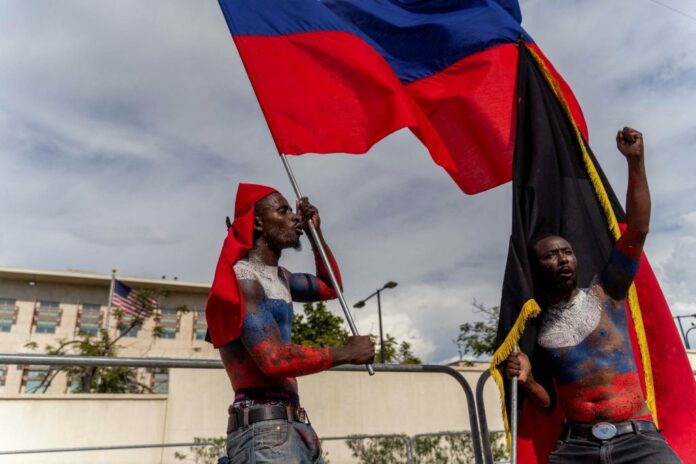
Two demonstrators in front of the American Embassy in Haiti
At the beginning of March 2024, before the CELAC Heads of State meeting in Kingstown (Saint Vincent and the Grenadines), Venezuelan President Nicolás Maduro denounced the new threats to the Haitian people: “We don’t agree with an invasion, whether open or camouflaged. The solution is for Latin America and the Caribbean to accompany, to help Haiti follow its own path and implement its own model, to rebuild its own state, its own institutions, and to resume all forms of cooperation such as the low-cost PetroCaribe oil program launched by Chávez”.
Three days later, in Caracas, he continued: “How many military interventions has the United States carried out in Haiti? When the rebirth of the Haitian people took place at the beginning of this century, we woke up to the news that a U.S. plane had kidnapped President Aristide and taken him out of the country. Haiti has been dismembered and martyred by imperialist interventionism, destroyed from within. There is talk today of an uprising of criminal gangs. But who equipped them with all those guns? These weapons came en masse from the United States. Who benefits from chaos? Who wants an invasion? What is happening in Haiti, they tried here in Venezuela when the extreme right destabilized the country, and they want to do it again here this year.”
“Gang war, spiral of violence”… The media’s “presentism” serves to conceal the US intervention against Haiti. Below, we publish the analysis of Haitian anthropology professor Jemima Pierre, who reveals the “imperialist laboratory” denounced by Cuba and Venezuela.
If your knowledge of Haiti comes solely from the Western media, you could be forgiven for believing the following assertions:
“Haiti, a “failed state” overrun by “gang violence”, can only regain its stability through the invasion of a foreign military force.”
“Haiti has a sovereign government that has the legal authority to request a military invasion of the country to “fight the gangs.”
“The United States, in pushing Kenya and CARICOM countries to conduct a foreign armed invasion of Haiti, is acting with the best of intentions in Haiti and is committed to ensuring peace and stability in Haiti and the Caribbean region.”
“CARICOM acts in solidarity with the Haitian people and supports Haitian sovereignty.”
None of these statements is true.In fact, they serve to obscure not only the motivations behind recent calls for foreign intervention in Haiti, but also the nature of Haiti’s current politico-economic reality and the history that has brought the country to this point. The repetition and saturation of these assertions in the media, even in the Caribbean region, has fooled much of the world into applauding foreign military intervention in Haiti. The truth is that, under the guise of helping Haiti, that country’s sovereignty and independence are in fact being stifled.
So what’s going on in Haiti? Why is the United States pushing for another foreign military invasion of Haiti? Why are CARICOM countries helping them? More importantly, why is the U.S. paying so much attention to the situation in Haiti?
To understand what is happening in Haiti is to understand the extent to which imperial, Western aggression against the Haitian people and Haitian sovereignty has been, and remains, constant. This aggression is reflected in the fact that Haiti is currently under foreign occupation, and has been for twenty years. This is no exaggeration. The only solution to the current crisis in Haiti is an end to the current foreign occupation.
In 2004, Haiti celebrated the bicentenary of its independence.
That same year, Haiti’s independence was thwarted by foreign powers.A year earlier, France, Canada and the United States had hatched a plot at the “Ottawa Initiative on Haiti” meetings to overthrow Haiti’s elected government.In the early hours of February 29, 2004, the plot unfolded. That morning, President Jean-Bertrand Aristide was kidnapped by U.S. Marines and sent to a military base in the Central African Republic.That day, George W. Bush announced that he was sending military forces to Haiti to “help stabilize the country”, and by evening, two thousand U.S., French and Canadian troops were on the ground.CARICOM, under the leadership of Jamaican Prime Minister P. J. Patterson, protested vigorously against the coup.
The Franco-American-Canadian invasion force targeted and killed Aristide supporters, oversaw the installation of a puppet prime minister and enabled the formation of a paramilitary force that set up anti-Aristide death squads.The coup was subsequently whitewashed by the United Nations, which, under the leadership of the permanent members of the UN Security Council, the USA and France, voted to send a “peacekeeping” mission to Haiti.The mission was deployed under a “Chapter 7” mandate, allowing foreign soldiers to use full force against the population.The UN took over from the US forces and created the United Nations Stabilization Mission in Haiti (MINUSTAH), responsible for military occupation under the guise of “establishing peace and security.”
A multi-billion-dollar operation, MINUSTAH had between 6,000 and 12,000 military and police personnel stationed in Haiti at any given time, as well as thousands of civilians.The military wing of the MINUSTAH mission was led by Brazil, which provided most of the troops.However, this multinational military occupation force also included soldiers from several Caribbean, South American and African countries, including Argentina, Chile, Colombia, Jamaica, Grenada, Benin, Burkina Faso, Egypt, Côte d’Ivoire, Nigeria, Rwanda, Senegal, Guinea, Cameroon, Niger and Mali.
The UN occupation under MINUSTAH was marked by its brutality towards the Haitian people. Civilians were attacked and murdered.Peacekeepers” committed sexual crimes.UN soldiers dumped human waste in rivers used for drinking water, triggering a cholera epidemic that killed between 10,000 and 40,000 people. The UN has never been held responsible for these crimes against the Haitian people.
The occupation was reinforced by the creation and operationalization of the Core Group.
The Core Group is an unelected group of foreigners from Brazil, Canada, France, Spain, the United States and Germany who have proclaimed themselves the arbiters of Haitian politics. Neither neutral nor passive, the Core Group plays an active, interventionist role in Haiti’s day-to-day political affairs.It has sought to expand and protect foreign economic interests in Haiti.It has consistently intervened in Haiti’s sovereign political affairs, often without the collaboration or consent of the Haitian government.
It is claimed that this occupation officially ended in 2017 with the official withdrawal of the MINUSTAH mission.Yet the UN remained in Haiti through a new office with a new acronym: BINUH, the United Nations Integrated Office in Haiti.Haiti is currently run by a group of non-Haitian foreigners, the Core Group and the BINUH office, the very people responsible for destroying its democracy.
The Core Group’s occupation is at the root of the country’s current predicament.
The occupying forces oversaw the complete collapse of the Haitian state, while allowing a group of rogue foreigners – countries and companies, non-governmental organizations and multinationals – to take over the shattered fragments of Haiti’s political economy, largely to serve foreign interests.In fact, it was under this occupation that the US and its allies, France and Canada, installed neo-duvalierist Michel Martelly in 2011, in the aftermath of the 2010 earthquake; Martelly’s successor, Jovenel Moïse, in 2016; and the current unelected de facto Prime Minister, Ariel Henry, after Moïse’s assassination in 2021.
Under the Core Group’s occupation, life for the average Haitian deteriorated. But let’s be clear: the Haitian people have not taken the occupation lightly (1).One of the less publicized aspects of the current “crisis” in Haiti is the ongoing protest by the Haitian people against the occupation and for self-determination. The people demonstrated by the hundreds of thousands in 2004 after Aristide was deposed by the United States, France and Canada.They protested against the imposition of another illegitimate president, Jovenel Moïse, in 2015 and 2016.They protested the U.S.-imposed corruption of Martelly and Moïse’s political party, PHTK, in 2018 and 2019.And they protested against the unelected, US-installed de facto prime minister, Ariel Henry.
For over two years now, the U.S. has been pushing for a stronger military presence in Haiti, and protected Ariel Henry’s unelected and unpopular puppet government until his recent resignation.They protected this government in order to continue controlling Haiti. In fact, Haiti’s puppet governments have served the United States well. For example, it was Ariel Henry who imposed the IMF-backed removal of fuel subsidies for the population, which the U.S. had been advocating for years and which plunged the Haitian people into even greater poverty.
The Core Group and BINUH are the very people responsible for destroying democracy in Haiti
Today, the United States needs to maintain its control over Haiti because the country is strategically important to its geopolitical objectives – the further militarization of the Caribbean and Latin American region in preparation for its confrontation with China, and the implementation of the Global Fragilities Act.Yet the US was unwilling to put its own boots on the ground, and turned first to Canada, then to Brazil, then to the countries of CELAC and CARICOM, all reluctant to lead the mission, even though they supported the call for military intervention.William Ruto’s Kenyan government jumped at the chance to lead the intervention, bought by a bag of money and a pat of approval on their neoliberal head.Haiti will now be invaded by the USA, but with the “dark side” of Kenya and the CARICOM countries as cover.
Did the citizens of Kenya and the CARICOM countries ask their governments why the USA, Canada or France wouldn’t send their own soldiers to invade and occupy Haiti this time? Have the citizens of these countries considered that the unelected de facto “Prime Minister”, Ariel Henry, has no legal basis for calling for a foreign invasion of Haiti?Have the citizens of these countries asked themselves why the U.S. or the UN is not calling for an armed invasion of a country like Ecuador, where brutal gangs have laid siege to the country, or Jamaica, where a state of emergency is almost permanent, or the U.S. itself, where mass shootings take place every day?Have the citizens of these countries asked themselves why the United States or the United Nations are not calling for an armed invasion of Israel, which is committing genocide?
Why Haiti?
We’re told that the U.S. interest in Haiti is humanitarian, that the U.S. wants to protect the Haitian people from “criminal gangs”. Yet U.S. weapons have flooded Haiti, and the U.S. has consistently rejected calls for the effective implementation of the UN Security Council resolution for an arms embargo against Haitian and U.S. elites importing weapons into the country.Moreover, when we speak of “gangs”, we must recognize that the most powerful gangs in the country are subsidiaries of the United States itself: the Bureau intégré des Nations unies (BINUH) and the Core Group, the two colonial entities that have effectively run the country since the 2004 coup. It is this gang, the Core Group and its installed Prime Minister, Henry, who, along with the UN office in Haiti, are insisting on this violent solution to the crisis in the country – a crisis they themselves helped to create.
As Haiti faces yet another invasion – this time nominally led by Kenya and the CARICOM countries – I’d like to ask the Caribbean community to reflect on the vast arsenal at the disposal of the US empire to convince the rest of the world to willingly accept yet another attack on Haitian sovereignty. I would also ask the Caribbean community to consider the fact that much of what we hear about Haiti today is a distortion – or outright fabrication – of Haiti’s social and political reality.
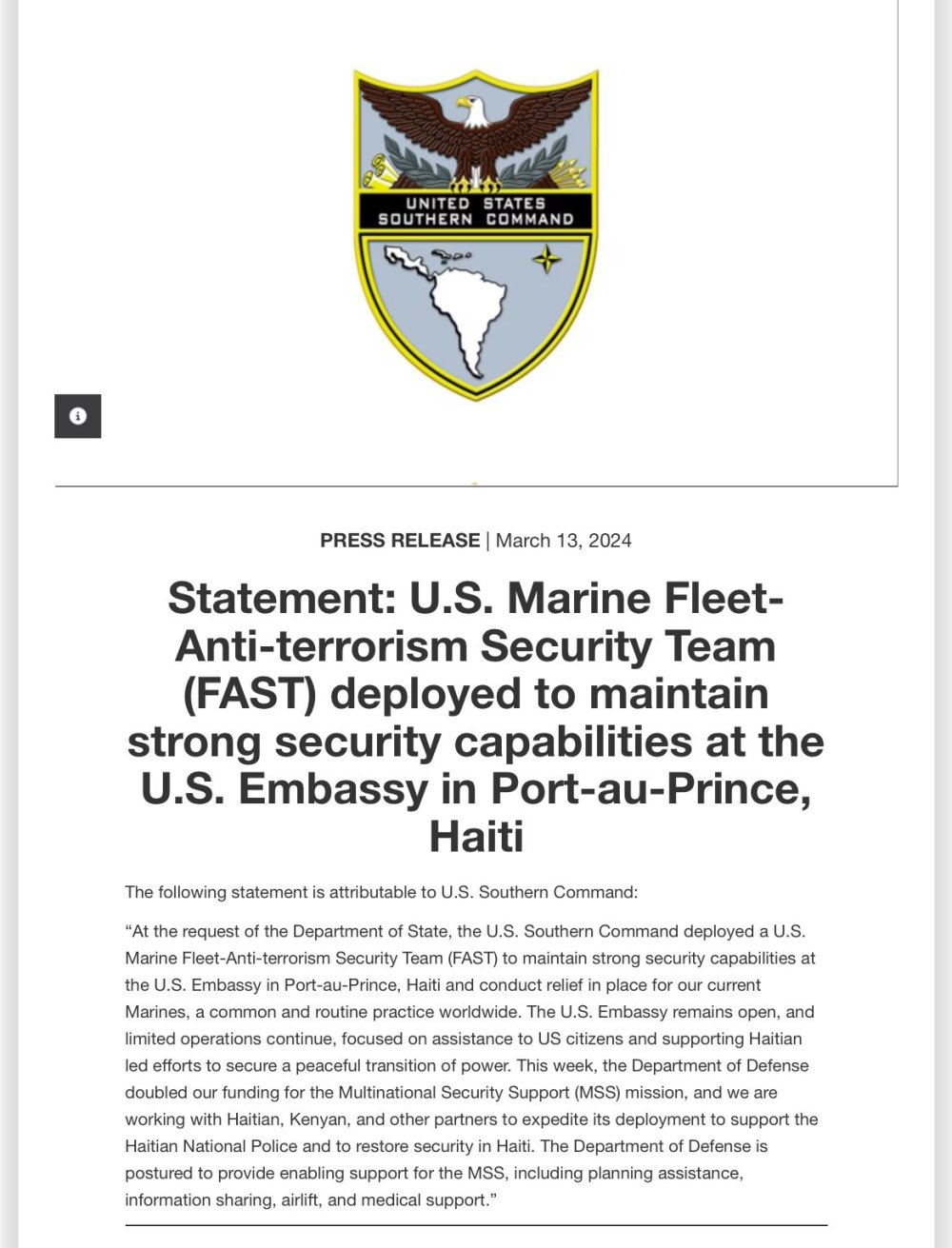
Document above: On March 13, Southern Command deploys an elite unit of U.S. Marines to Port-au-Prince, Haiti.
Most of them lack the historical context, especially when it comes to the incessant interference of foreign agents and institutions, to understand the Haitian situation. Much of it is based on a deep-seated racism that assumes blacks are ungovernable while opposing the implications of Haiti’s historic commitment to black freedom.
At the same time, the Haitian community’s ongoing protests against foreign troops and Western interference bear witness to its unshakeable courage. Haiti is the scene of one of the world’s longest struggles for black liberation and anti-colonial independence. This explains the US empire’s constant reactionary assault on the Haitian people, punishing their repeated attempts at sovereignty with decades of instability designed to guarantee and extend US hegemony. For two centuries, the imperial counter-insurgency against Haiti has aimed to put an end to the most ambitious revolutionary experiment in the modern world. The tactics deployed to attack Haitian sovereignty have been consistent and persistent.
As Linda Thomas-Greenfield, the U.S. Ambassador to the United Nations, was in Guyana last weekend, in part to “continue to rally global support for the Multinational Security Support Mission (MSS) in Haiti,” we must ask ourselves why CARICOM leaders want to participate in the destruction of Haitian sovereignty and people. And we must remember that the “crisis” in Haiti was created and maintained by the United States and its allies. CARICOM countries must oppose the foreign occupation of Haiti and not prolong the crisis.
Following Ariel Henry’s resignation, the U.S. is creating Haiti’s new “government” by giving its Haitian bourgeoisie protégés 24 to 48 hours to send names to a “presidential council” whose first priority is to prepare the country for foreign armed intervention.
Any Haitian taking part in this masquerade is a traitor.
Of Haitian origin, Jemima Pierre is a professor of anthropology at UCLA, at the Institute of Social Justice of the University of British Columbia and a research associate at the Center for the Study of Race, gender and social class at the University of Johannesburg. Coordinator for Haiti / America of the Black Alliance for Peace ( Black Alliance for Peace )
Note:
(1) Read https://venezuelainfos.wordpress.com/20 ... venezuela/
Translation by Internationalist 360°
https://libya360.wordpress.com/2024/03/ ... -haitians/
